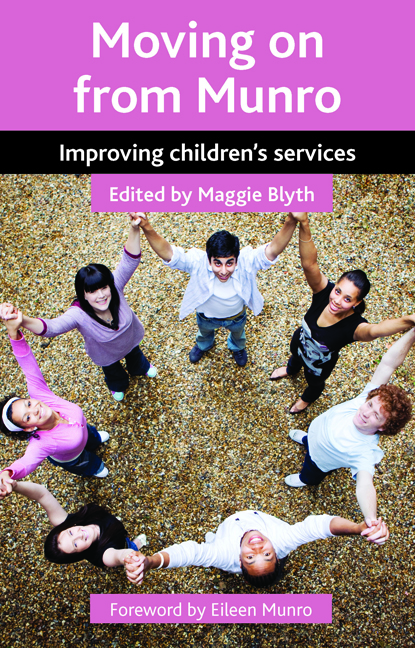Book contents
- Frontmatter
- Contents
- List of abbreviations
- Notes on contributors
- Acknowledgements
- Foreword
- Introduction
- 1 Getting the right things right
- 2 Child protection: 40 years of learning but where next?
- 3 Doing something different: reconfiguring front-line services: opening up the market
- 4 Re-imagining early help: looking forward, looking back
- 5 Children should be seen and heard: understanding the child’s experience
- 6 Responding to adolescent risk: continuing challenges
- 7 Moving on with Munro: child sexual exploitation within a child protection framework
- 8 Missing children post-Munro
- 9 Symbolic half-measures? On local safeguarding children boards, their contributions and challenges
- Conclusion
- Index
8 - Missing children post-Munro
Published online by Cambridge University Press: 03 February 2022
- Frontmatter
- Contents
- List of abbreviations
- Notes on contributors
- Acknowledgements
- Foreword
- Introduction
- 1 Getting the right things right
- 2 Child protection: 40 years of learning but where next?
- 3 Doing something different: reconfiguring front-line services: opening up the market
- 4 Re-imagining early help: looking forward, looking back
- 5 Children should be seen and heard: understanding the child’s experience
- 6 Responding to adolescent risk: continuing challenges
- 7 Moving on with Munro: child sexual exploitation within a child protection framework
- 8 Missing children post-Munro
- 9 Symbolic half-measures? On local safeguarding children boards, their contributions and challenges
- Conclusion
- Index
Summary
Background
Historically, the importance of missing persons has not been sufficiently recognised, with cases often referred to as ‘just another misper’ (a common abbreviation for missing person). Children going missing have not always attracted much attention, particularly those who are looked after and/or go missing frequently. Looking back over my past 16 years of involvement in this area, there was real difficulty getting any interest in the subject in the earlier period. However, since the government response to the Munro review (HM Government, 2012), there has been increased momentum in prioritising the risks facing this group of children. This chapter explores the progress made in identifying responses to children going missing and highlights the key challenges that remain in relation to information sharing, integrated working and understanding the full extent of the problem. It also examines the links between children missing and wider exploitation, including sexual exploitation and trafficking, particularly for children in residential care.
There have, of course, been historic peaks of interest, mainly prompted by high-profile cases such as Holly Wells and Jessica Chapman, and Sarah Payne. However, while attention was heightened by these cases, it was not sustained for long and ‘missing’ once again dipped out of consciousness. A relatively small number of people strive to maintain awareness of the issues.
Madeleine McCann's tragic disappearance in 2007 seemed to be a watershed and the level of interest has been maintained since then. Since that time, a number of other factors have contributed to a higher profile for missing children. The year 2011 was significant in this regard, because of the Munro review and also because of the following milestones:
• 25 May 2011: the government announced the decision to give the responsibility for missing children to the Child Exploitation and Online Protection Centre (CEOP), now a command of the National Crime Agency.
• October 2011: the Office of the Children's Commissioner (OCC) commenced its inquiry into child sexual exploitation (CSE) in groups and gangs, which would identify the links between going missing and this type of abuse (OCC, 2011).
• December 2011: the government published its report, Missing children and adults: a cross-government strategy (HM Government, 2011).
- Type
- Chapter
- Information
- Moving on from MunroImproving Children's Services, pp. 143 - 158Publisher: Bristol University PressPrint publication year: 2014



